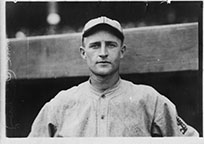Knoxville Citizens Hold Rousing Reception for Baseball Star.
October 24, 1914 Age 23
William Leopold Doak, who pitches for the St. Louis baseball club of the National League in the summertime and resides in Knoxville during the winter months, was the king bee last night at a demonstration in his honor at the First Methodist Protestant Church. The reception was given by the members of the Bible class and was held in the social room and gymnasium of the handsome church on the hilltops. Every seat in the hall was occupied and the star twirler of the Cardinal team was toasted and complimented and applauded time and again.
The scene of festivities was elaborately decorated with flags, pennants, baseballs, palms, great clusters of autumn leaves and conspicuous upon one of the walls appeared a life-size portrait of Doak. Long rows of tables were liberally laden with dainties, prepared by the Ladies’ Aid Society of the church and other fair members of the congregation, who served a sumptuous feast, in many courses. Then the vocal and musical portion of the program was commenced.
APPROPRIATE NUMBERS.
Joseph N. Mackrell officiated as toast-master. Popular song were rendered by the National quartet, a humorous baseball recitation was given by Waldo P. Breeden, a trombone solo was played by Percy Dorrington and a piano number was played by James Prophater. Samuel E. Watters, assistant secretary of the Pittsburgh ball club, read letters of regret from many persons of note who were unable to attend, among them being Manager Miller J. Huggins of the St. Louis Cardinals, Manager Wilbert Robinson of the Brooklyn Dodgers, Manager John J. McGraw of the New York Giants, John Bunny Smith, who is coaching a basketball team at Utica, N. Y. and President Barney Dreyfuss of the Pittsburgh Nationals.
A message of regret from Governor John K. Tener, president of the league, was also read. It was worded as follows: “Extend my congratulations to Mr. Doak and felicitate those present in doing honor to one of the greatest exponents of baseball. He is a great credit to the National League and honors the community from which he comes. Regret my inability to be present with you.”
TRIBUTES TO DOAK.
The hilltop hero’s baseball career was recalled from the days when he was known as Willie Doak, of the local lots, until he grew to fame and went by the name of Bill Doak, who was nosed out of the lead in the National League race by the narrowest margin this year. Rev. A. E. Fletcher, pastor of the church, spoke of Doak from a Knoxville standpoint and commended him for the splendid example he has been setting.
Umpire Harry Johnson paid a handsome tribute when he said: “Having worked in a number of games in which Doak was pitching and having thus had occasion to watch his delivery closely, I am glad to state that if I were permitted to name an all-American baseball team composed of the best players in the two major leagues, my first choice for pitcher would be none other than Bill Doak.”
Doak himself was called upon, and he expressed his pride in being a Pittsburgher, a native of the South Hills, a member of the First Methodist Protestant Church, and a member of the Sunday school. Among others who responded were Chuck Deal, Al Mamaux, Joe Schultz, Secretary L.H. Constans of the Pittsburgh baseball club, sports writerJames Jerpe, father-in-law Edward Porter and State Senator John P. Moore.
Among the guests who were introduced were Doak’s mother, Mrs. W.E. Doak (Bertha); his wife (Jesse); and his sister, Miss Hazel Doak. The ball player’s father, William E. Doak, was unable to attend the reception, having been taken quite ill earlier in the day.
